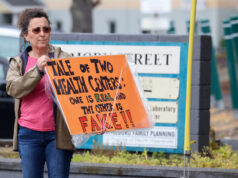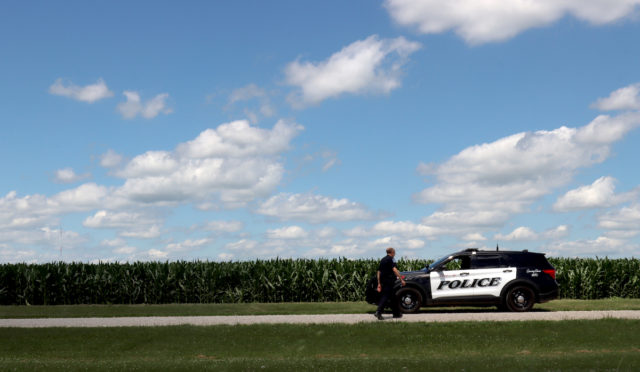
(Editor’s note: This article is part of “In Pursuit,” an investigation into police reform and accountability in America, produced by the Carnegie-Knight News21 program. For more stories, visit inpursuit.news21.com.)
By Henry Bredemeier and Sarah Emily Baum | News21
ALTOONA, Iowa — Whitney Smith McIntosh adjusts her Blue Lives Matter hat and Blue Lives Matter shirt, places her Blue Lives Matter flag in the holder next to her door, and shoos her dog away from her “Kim Reynolds for Governor” yard sign.
The community activist and mother of three speaks of her family’s history. Her mother immigrated from Sicily at age 4. Her father’s side can be traced to people who were enslaved on a South Carolina plantation.
She fondly remembers her paternal grandfather: one of the first Black police officers in Pittsburgh. Nearly everyone in her father’s family worked in law enforcement or the military, she says, which instilled in her a deep reverence for those on the force.
“My grandad would come home, take off his gun belt, hang it on the nail and start cooking dinner,” she said, recalling a story her father told her.
That family history inspired her in the summer of 2020. As fellow Iowans poured onto the streets to the rallying cry of “Black lives matter,” she connected with a man named Robert Gamble on Facebook. The two later co-founded America Backs the Blue: Iowa, which organized pro-police rallies, coordinated lobbying days at the Iowa State Capitol and sent police officers care packages that included thank you cards and sandwiches.
“I was getting really sick of police officers being blamed for people being stupid,” Smith McIntosh said.
Neither she nor Gamble work in law enforcement, but their efforts exemplify a trend in American politics. Since cries for police reform roiled the U.S. in 2020, 16 state legislatures have enacted so-called “Back the Blue” laws to bolster law enforcement, according to data collected by the National Conference of State Legislatures. In the previous four years, five states had enacted such legislation.
In various states, lawmakers have reclassified law enforcement as a protected class under hate crime statutes, restricted local government efforts to defund the police, increased limits and penalties for protest-related crimes, limited the filming of police officers, and granted officers more rights during misconduct investigations. States have enacted Back the Blue laws for decades, but such moves have increased in the past two years to counter calls for police reforms.
George Floyd protests fueled pro-police legislation
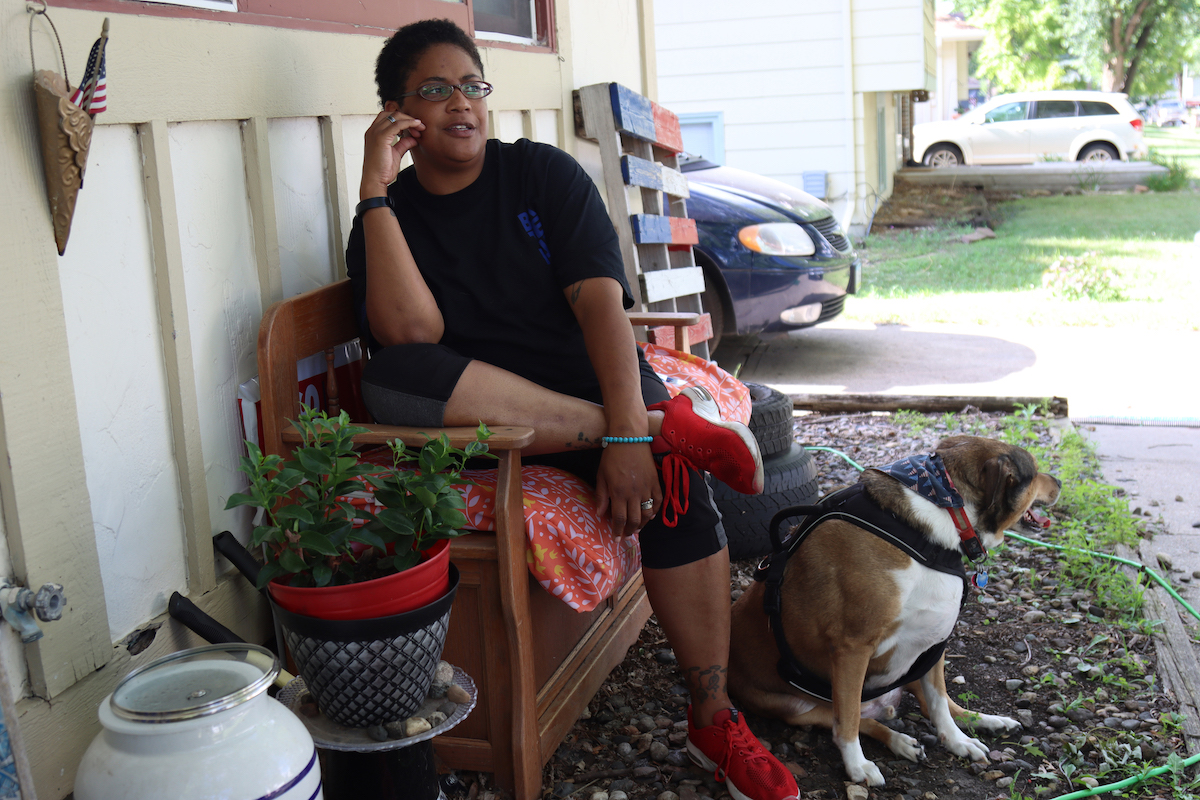
Several lawmakers and academic experts cited protests following the May 2020 killing of George Floyd by a Minneapolis police officer as a catalyst for these new laws. In Iowa, as in many other places, most protests were peaceful, according to a report by the Armed Conflict Location & Event Data Project, though some point to images of smashed windows and burning stores as cause for alarm.
Jarad Klein, a former Republican state representative from Keota, chaired the Iowa Legislature’s Public Safety Committee in 2021 when the state passed its Back the Blue Act.
“We had protesters on I-80,” Klein recalled. “We had people destroying public property in and around Iowa City. We had heard discussions from people about not funding law enforcement any further, about taking cops out of schools. We heard people talking about all sorts of things that had us and our constituents extremely nervous and extremely worried.”
Klein said the unprecedented protests generated political momentum to pass more pro-police laws. Klein said his constituents were worried about the destruction of public property and calls to defund the police.
The Iowa Legislature’s action was necessary, said state Rep. Mike Sexton, a Republican who represents Rockwell City. He contends police are “under attack in the U.S.”
“It makes me sad,” he said. “Members of society are so disrespectful to our law enforcement and our first responders that risk their lives every day.“
Jonathan Weiler, a professor of global studies at the University of North Carolina and author of Authoritarianism and Polarization in American Politics, said the nationwide protests after Floyd’s death stoked political divides and paved the way for political opportunism.
“There’s been an increase in crime, especially homicide rates, in the last couple of years, and it’s really anybody’s guess why that’s happening,” Weiler said. “But it’s also true that our streets are a lot safer than they were, generally speaking, 15 or 20 years ago.
“But if you’re constantly reminded, crime and security, lack of safety, etc., you’re going to be more predisposed to support laws that give police more latitude or more impunity.”
A 2021 Ipsos poll showed that the majority of Americans oppose the “defund the police” movement, traction for which has slowed. A 2021 Pew Research Center report showed Americans want more funding for police, while a 2022 Pew video report shows that trust in police varies by politics and race.
Critics say Back the Blue laws often are largely performative because systems already are in place that make moves such as hate crime designations for police unnecessary or prone to legal challenges.
Ben Laughlin, a policy research coordinator for Poder in Action, a nonprofit in Phoenix, said fractured trust is a downside to these measures.
“Whenever you’re passing laws like this, it only further harms that (trust),” Laughlin said, “and I think police aren’t looking to actually build trust with community members, they’re looking to save their legitimacy.”
Several Iowa law-enforcement leaders expressed appreciation for the sentiment behind Back the Blue laws but said they had hoped lawmakers would address officers’ more pressing concerns, such as increasing salaries and boosting officer retention.
Mason City police Capt. Mike “Mack” McKelvey is one of those who wishes Iowa’s Back the Blue Act had focused on bigger problems.
“I don’t think Iowa had the problem with the toppling statues, shining laser pointers at the officers, for those cities that had protests,” he said. “So to us, I think we felt some of that language or rhetoric was more aimed at the national stuff going on around the country, (it) didn’t really apply to us.
“The problem is, for a lot of us, I think we could see our peers kind of having that meaningful conversation that they’re actively thinking about just quitting law enforcement and getting out of it — going into private industry, which is concerning.”
‘It’s definitely going to have a chilling effect’
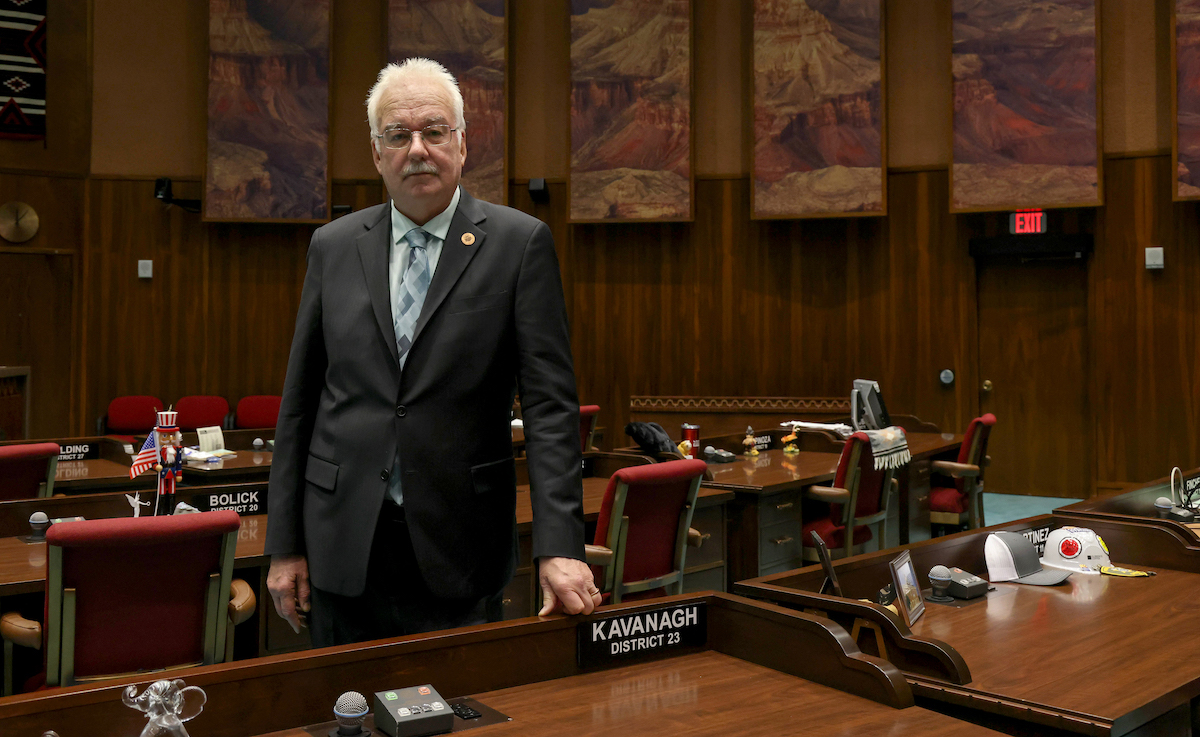
Arizona lawmaker John Kavanagh this year sponsored a bill to prohibit taking videos of police officers from less than eight feet away. He said it stemmed from officers’ concerns, and he hopes other states will mimic the measure.
His support for police began more than five decades ago in New York City. After graduating from New York University in 1973, he spent 20 years in the Port Authority Police Department before moving to Arizona and pursuing politics.
Kavanagh has served in the Arizona Senate and House of Representatives since 2007, and in November he won the race for the newly redrawn State Senate District 3. He was endorsed by three major police organizations.
His proposal for video restrictions — based on what he calls “unfair due process issues” — was signed into law in July and was to have taken effect in September. In addition to restricting the distance from which citizens can film police, if the person ignores a verbal warning, they could be charged with a misdemeanor. Exceptions include if a person is the subject of the police contact or if the person is in a vehicle, as long as the person is not “interfering with lawful police actions.”
“This particular filming bill was prompted by a couple of cops from Tucson who called my office and said, ‘You’ve got to help us, these groups that are anti-police, they’re showing up at scenes, they’re going right behind us,’” Kavanagh said. “And, in fact, somebody sent me some TV footage of a TV station which showed them at the scene yelling curses at the cops. So, yeah, it was a problem, and that’s what got me into it in the first place.”
Kavanagh said the law is meant to keep officers safe. He recalls tense situations when he was making arrests.
“You don’t know who’s who,” Kavanagh said. “So you’re in the process of questioning a suspicious person, handling a distraught, emotionally disturbed person, making an arrest. You have to focus on that person. You suddenly see somebody like one or two feet behind you. … They’re standing a foot behind the cop or foot beside the cop when the cop’s in an encounter. That’s crazy. I don’t know anybody in their right mind who would do that. It’s dangerous.”
Kavanagh said there is no reason to record up close because cameras today are good enough to capture everything from a longer distance.
“One of the most ridiculous arguments against the bill is that incidents like the George Floyd incident … would never have come to light,” Kavanagh said. “I looked at the George Floyd video. That person is probably eight, 10, even 15 feet away. Maybe further, if they’re using a zoom lens. They are clearly not within several feet. And they captured the whole thing. (…) Anybody who says you can’t get a good shot at eight feet is making up a stupid argument, in my opinion.”
The law was to take effect on Sept. 24 but was temporarily blocked by a federal judge on First Amendment grounds. Judge John Tuchi gave state agencies the chance to defend the law by Sept. 16, but none stepped forward. Tuchi will decide later whether to make the injunction permanent.
Six separate circuits of the U.S. Courts of Appeals — including the Ninth Circuit, which covers Arizona — have established the right to film law enforcement in public spaces under the First Amendment.
Laughlin, the Phoenix activist, is concerned that giving police discretion to stop people from recording their activity would only increase the amount of police violence being “swept under the rug.”
“It’s definitely going to have a chilling effect,” Laughlin said. “I think that, you know, community members that want to film the police are going to be much more hesitant to do so. I think it gives police officers a lot more leverage to obscure violence that’s happening (by disrupting) the filming.”
Lawsuit argues protesters violated officers’ civil rights

Some of the most ubiquitous images of police reform came from up-close-and-personal videos and photos of police officers during protests. But police protection laws go beyond visuals. In Iowa, a fateful encounter outside the State Capitol between activists and police led to officers leveraging a key provision of the state’s new Back the Blue law.
According to a lawsuit filed by two police officers in the Polk County District Court of Iowa, protesters’ actions on July 1, 2020, were “nothing short of domestic terrorism.”
“Not bad for an unarmed farmer, I guess,” said Jennie Erwin, who was among five people named in the suit. She discussed the matter sitting on the Capitol lawn while wearing overalls from a day in the fields, much like that July day two years ago.
The grassy spot isn’t far from where she and other protesters with the Des Moines Black Liberation Movement had shown up, week after week, to demand legislators pass a bill to restore voting rights to people incarcerated in jails and prisons.
But on July 1, 2020, the normally peaceful demonstrations escalated. Erwin arrived at the Capitol to find Indira Sheumaker, an activist, face down on the ground and a large man kneeling on top of her. He was wearing khakis and a dark polo shirt.
“My choices were to stand back and film like other people were doing, or do something,” Erwin said. “Lots of people filmed when George Floyd died, too. That didn’t help him.”
She pulled on the man’s leg, and he fell off Sheumaker. Erwin stepped back and realized the man had a badge. It was officer Peter Wilson, a veteran of the Des Moines Police Department. At first she ran, but then stopped and was arrested.
Emboldened by the Back the Blue Act, which cements an officer’s right to sue civilians they encounter on the job, Wilson and his colleague, officer Jeffrey George, sued Erwin, Sheumaker and three other protesters at the Capitol that day. The officers claim the activists violated the officers’ civil rights by physically interfering with their attempted arrests.
“While purportedly claiming to be engaged in peaceful protest, their actions and plans were nothing short of domestic terrorism,” the lawsuit states. “On July 1, 2020, the named defendants utilized ‘de-arresting’ tactics against the plaintiffs during a violent protest.”
Sheumaker is countersuing, claiming that the officers used excessive force and violated her civil rights. The ACLU also got involved in the aftermath of the protests, successfully fighting a ban to keep protesters from the Iowa State Capitol.
Jalesha Johnson, a senior organizer of the Des Moines protests, said some group members had discussed flouting the ban when it was still in force, “but we didn’t want to risk it.”
But, even when the ban was lifted, the damage had already been done, Johnson said. She and other members of the Des Moines Black Liberation Movement now avoid the Capitol, which was once a space of empowerment for her, a space where her voice had finally been heard.
“My biggest fight right now is thinking about how I can make this city safer, not physically, but culturally and emotionally for the people that live here, most especially young black people who live here — especially young, Black queer people,” she said.
News laws expand penalties for protest actions
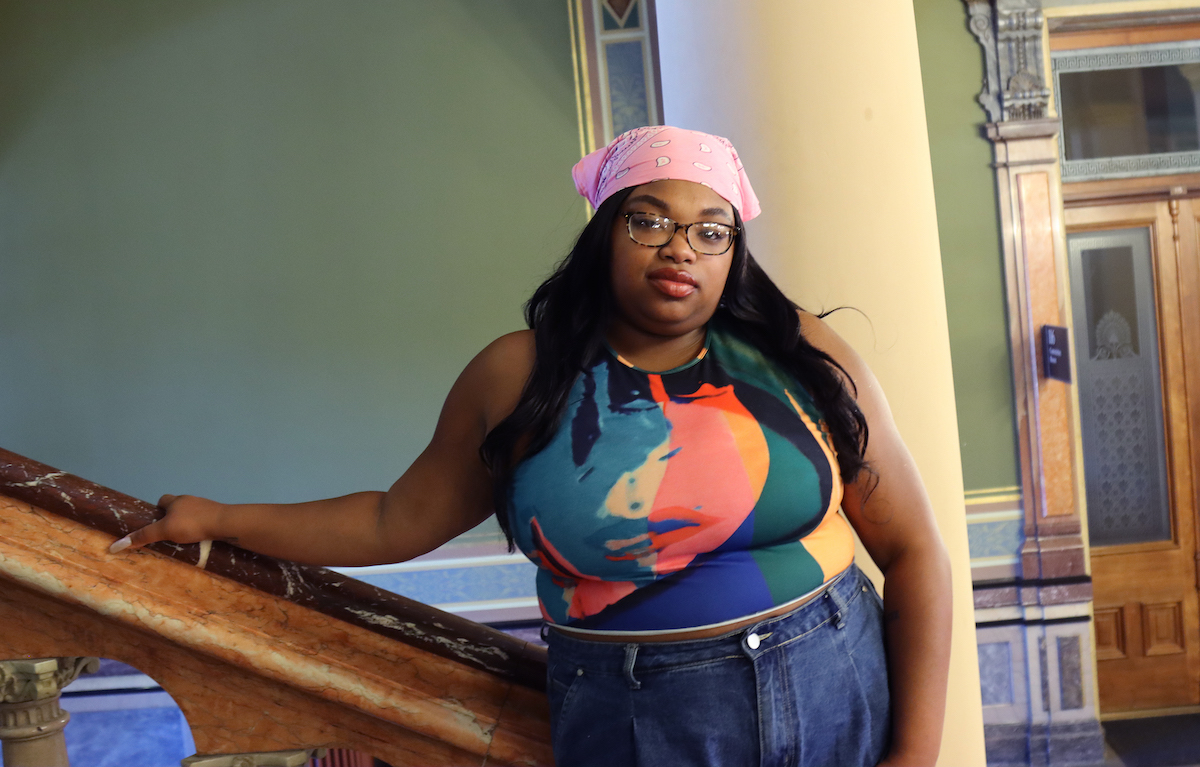
Iowa’s Back the Blue Act has a plethora of other provisions: It limits people’s ability to sue police officers and raises penalties for rioting and other protest-related crimes.
Other states have enacted laws to bolster the legal arsenal police can use to arrest protestors. Since 2017, at least 17 states — nine in the past two years — have enacted heightened penalties for protests that trespass on or block “critical infrastructure,” such as roads and oil pipelines.
Klein, the legislator who was integral in passing the Back the Blue Act, sees the matter differently than Johnson.
“Peaceful protesting is a great and wonderful thing. What was happening was not peaceful, and there were people that were getting put in danger, and that needed to be addressed,” he said. “There was nothing done or intended to be done to harm their First Amendment rights.”
Although the five defendants pleaded guilty in criminal court and served short stints in jail or payed fines, that wasn’t enough, said Mark Hedberg, a Des Moines police union attorney who separately represents the officers in the civil case.
Through Hedberg, officers Wilson and George declined to comment. Sheumaker, who has since been elected to the Des Moines City Council, did not reply to multiple requests for comment.
Some lawyers and critics say increased police protections and harsh penalties for protest-related crimes can be used to abuse constitutional rights. Nationwide, police arrested upwards of 10,000 protesters who mobilized after Floyd’s murder.
“(They) increased the penalties for a lot of things that would be commonplace in individuals exercising their First Amendment rights,” said Glen Downey, an Iowa civil rights attorney who has worked with the ACLU. “That makes the chilling effect even greater, because you’re facing actual jail time as opposed to a few days in jail or a fine.”
Des Moines defense attorney Benjamin Lynch said he defended clients in cases related to the state’s George Floyd protests, many of whom were swept off the streets in mass arrests.
“They would use that exact same verbiage and just copy and paste it for every single person that they arrested, regardless of what that person did,” Lynch said. “It was not specific whatsoever. When we started asking the prosecutors about these charges, they didn’t have anything to make the charges stick. It was mainly used for crowd control.”
Sexton, the legislator, is undeterred by complaints.
“If they believe that they were unjustly penalized or arrested, then that’s what the judicial system is for,” he said. “(They) just skipped over the judicial part and just decided to do what they wanted to do.”
Protecting police who are under investigation
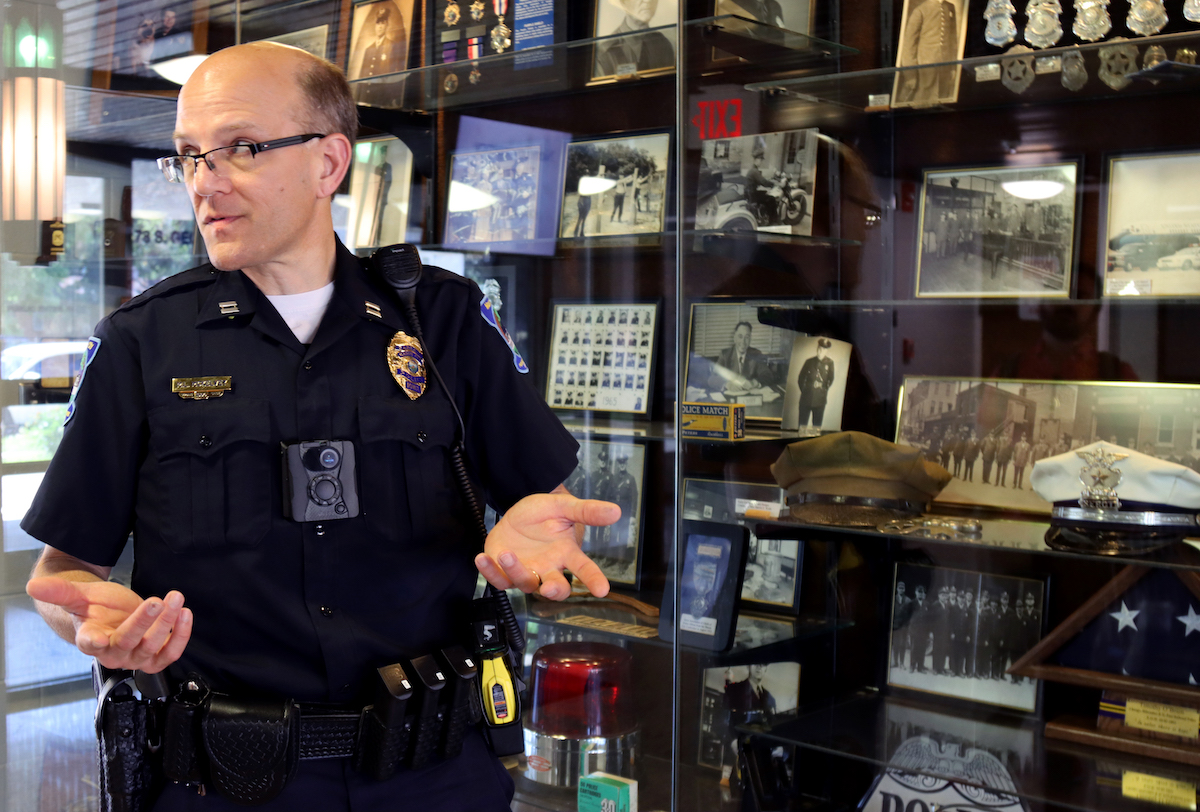
In the lobby of the Mason City police headquarters, a small police museum stands behind thick glass. Among its treasures are bullet casings from the robbery of Newton National Bank by Depression-era gangster and folk hero John Dillinger in 1934.
Iowa Gov. Kim Reynolds signed the Back the Blue Act into law on June 17, 2021. McKelvey, who also serves as the president of the Iowa Peace Officers Association, and Jeff Brinkley, the chief of the Mason City Police Department since 2016 and vice president of the Iowa Police Chiefs Association, said their organizations were not consulted on the bill.
Still, McKelvey said, he appreciates the law. He said seeing some states — such as Colorado, Connecticut and New Mexico — get rid of so-called Police Officers’ Bill of Rights laws “scared the crap out of us.”
Most notably, the new Iowa law strengthens qualified immunity under case law, meaning residents cannot sue officers for damages, with certain exceptions. Qualified immunity has been in place for half a century, but its protections have been extended in recent years. While some states have eliminated qualified immunity and Congress is considering doing so, Iowa has worked to strengthen it.
“To expect cops to be 100 percent right, 100 percent of the time — it’s just (…) you can’t, you know,” McKelvey said. “Qualified immunity, I think, keeps that perspective open. That hey, we’re human, we’re not perfect, trying to do the best we can, but, you know, sometimes we don’t know every single piece of information and you have to make that split-second decision based on what the officer at the scene knew, and sometimes you’re right and sometimes you’re wrong.”
Alexander Reinert, professor of litigation and advocacy at the Cardozo School of Law, said the standard of proof to pursue legal action against police has become increasingly difficult to meet.
“So it means for a plaintiff, the bar of showing clearly established law has become very, very high, such that in Justice (Sonia) Sotomayor’s words, it becomes essentially absolute immunity for police officers,” Reinert said.
Brinkley didn’t see qualified immunity as an issue to be addressed because it already is clearly established in the courts. And Clark Neily, senior vice president for legal studies at the Cato Institute, said that, too often, an officer clearly in the wrong is protected.
“It diminishes the amount of accountability that police have, makes it much easier for them to violate people’s rights without any recourse,” Neily said. “And I think it’s morally indefensible. If you engage in conduct that wrongfully hurts another person, you have a moral obligation to make that person whole, you know, to pay for the damages that you caused.”
History, hate crimes and police protections
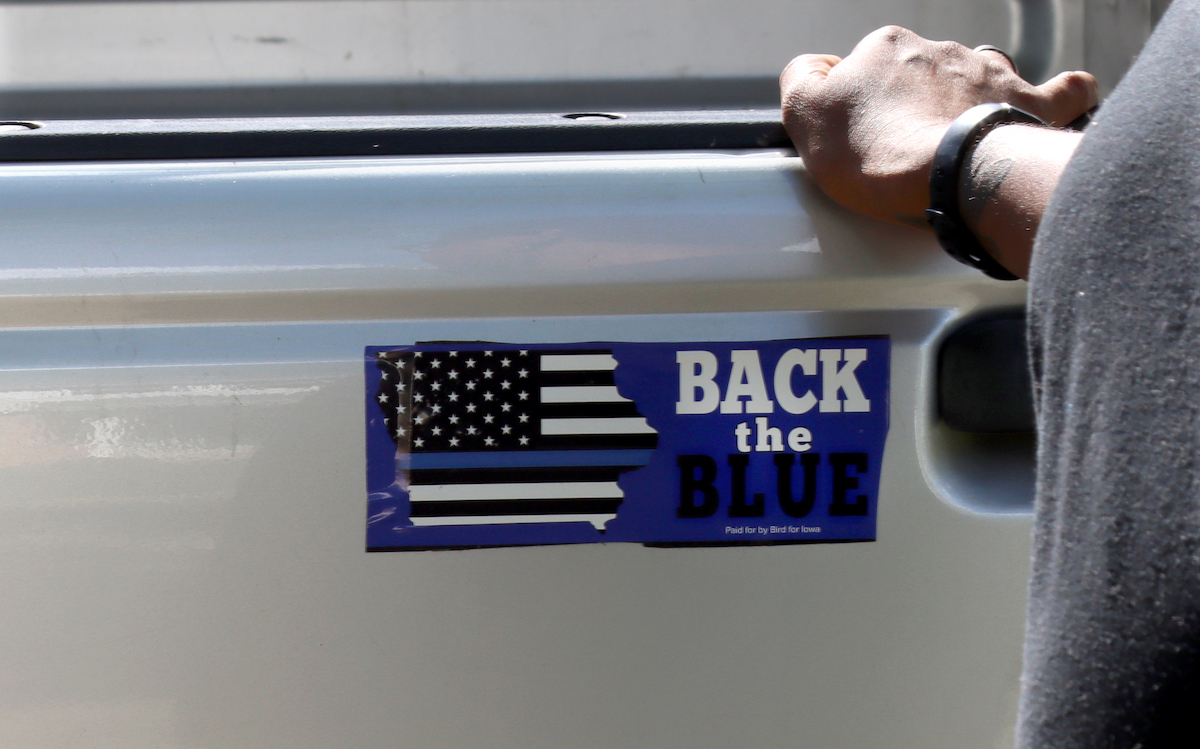
Some provisions for qualified immunity have existed since a U.S. Supreme Court decision half a century ago. Members of civilian review boards and oversight organizations that review accusations of police misconduct have been weighted heavily with police, and most lack the power to directly discipline officers.
In 2016, Louisiana became the first state to protect police officers, firefighters and emergency medical crews under hate crime law. Since then, similar legislation has been enacted in Kentucky, Mississippi, Texas, Utah and, most recently, Georgia.
But the newest battle on behalf of police departments was budgetary — an attempted financial blow avoided in large part by societal shifts and political will.
At a signing ceremony in May 2021, Georgia Gov. Brian Kemp, surrounded by law enforcement, denounced the “far-left” movement to defund the police.
According to Bloomberg, 11 major cities have cut police budgets by more than 5 percent. Florida, Missouri, Texas and Georgia took steps to ensure those actions wouldn’t go unpunished in their states.
Georgia state law does not allow county governments, with some exceptions, to cut their law enforcement budget by more than 5 percent — an action that came less than a year after the Atlanta City Council narrowly rejected a move to slice the police budget by a third.
Police departments hope for attention to other issues
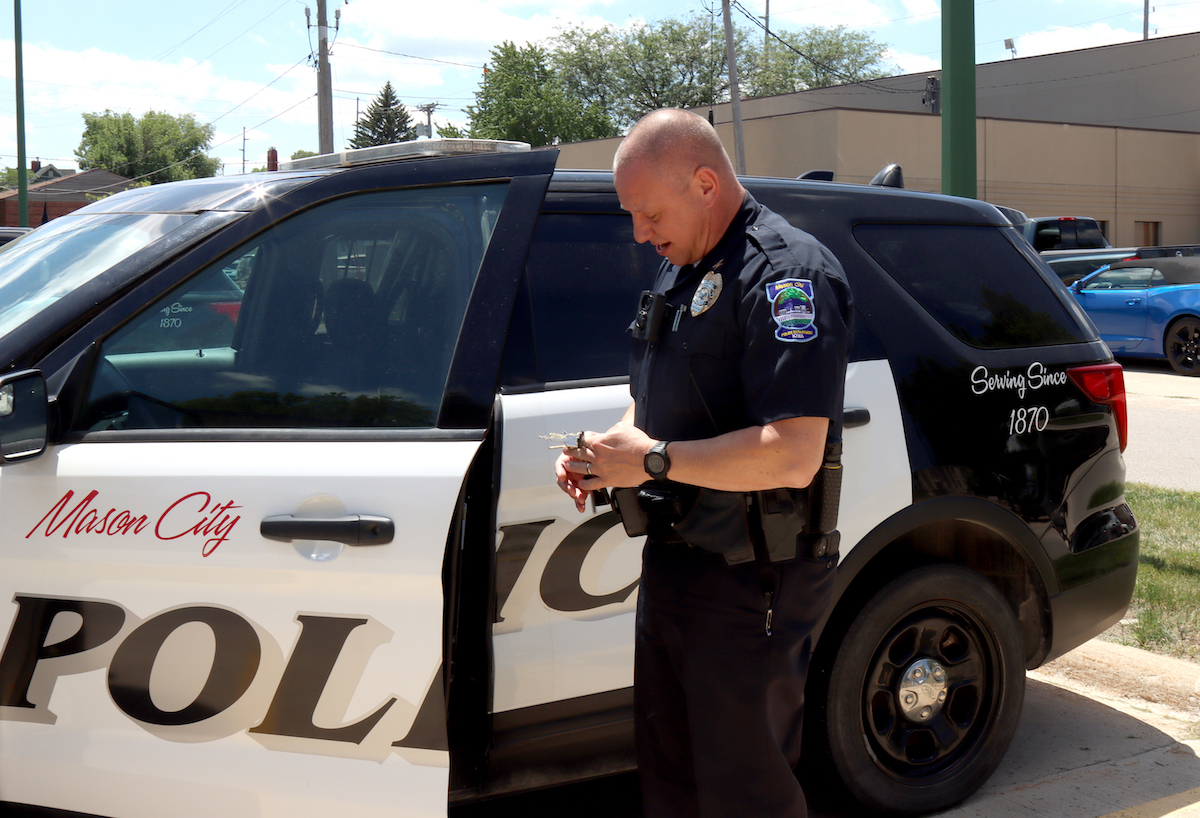
Some law-enforcement leaders want lawmakers’ attention on other matters. The pandemic, protests and burnout have led to a significant increase in early retirements and resignations among police officers across the country, according to research by the Police Executive Research Forum. Some departments have seen early retirements increase by as much as 45 percent, and hiring of police officers has slowed by 5 percent across the country.
McKelvey said he has seen the effects in Mason City.
“With COVID and the great resignation, too, I think private industries were offering more money to recruit people,” McKelvey said. “So some people could go be a truck driver and earn the same amount of money and not get the grief and, you know, criticism of being a cop.”
Since 2020, Brinkley, the Mason City chief, said four officers have left their department to pursue a career in private industry. The Mason City Police Department is staffed at 42 officers. With more officers leaving, Brinkley said recruiting new officers has become an around-the-clock ordeal. The department has 36 applicants for the current phase of recruitment, less than half of what recruitment peaked at in the past eight years.
Kavanagh said one reason he wrote the filming legislation was that he hopes that the extra protections would help retain police officers.
“A lot of cops are leaving because they feel, for a variety of reasons, that they’re under attack,” Kavanagh said. “And when good people don’t want to be cops and good cops leave, that’s not good for public safety.”
Brinkley said increased funding for police, especially for police academies, is an important aspect of improve policing.
The local academy is “funded at the rate of about $1.3 or $1.4 million, and they only need $3.1 or $3.2 million a year right now for operations in a state that had a surplus last year of hundreds of millions of dollars,” Brinkley said. “That seems like a really straightforward approach to try to make policing better.”
But police advocates and leaders acknowledge that police reform should go beyond what police departments want for their officers and must extend to the communities they serve.
Smith McIntosh still believes there is work to be done to mend that relationship.
“The police still need to do their work,” she said. “They still need to, like, get into the community and earn the trust. And the community needs to be open to that. But I don’t know, there’s no silver bullet to that.”
Ultimately, Smith McIntosh hopes her organization, America Backs the Blue: Iowa, fades away.
“It would be really nice if we just disappeared because we didn’t need to exist,” she said. “Everybody should just be able to live in the place and we shouldn’t have to have flag rallies for them. And, if it takes us, like, calling out a police officer because he did something, frankly, we don’t mind doing that too, because that’s also supporting the police because you don’t want to keep somebody who’s not good.”
McKelvey said he hopes to restore an image of policing he believes was tainted by actions that led to the murder of George Floyd.
“It kind of painted all of law enforcement with that broad brush, like that’s the way we do business,” McKelvey said. “And I don’t think there’s any agency that I know of that actually trains and approves law enforcement to kneel on somebody’s neck, especially for several minutes, when there’s no need to. And that’s just not the way we’re trained In Iowa, that’s not the way we do it. But just everything that came after that, I think we’re trying to recover from.”














